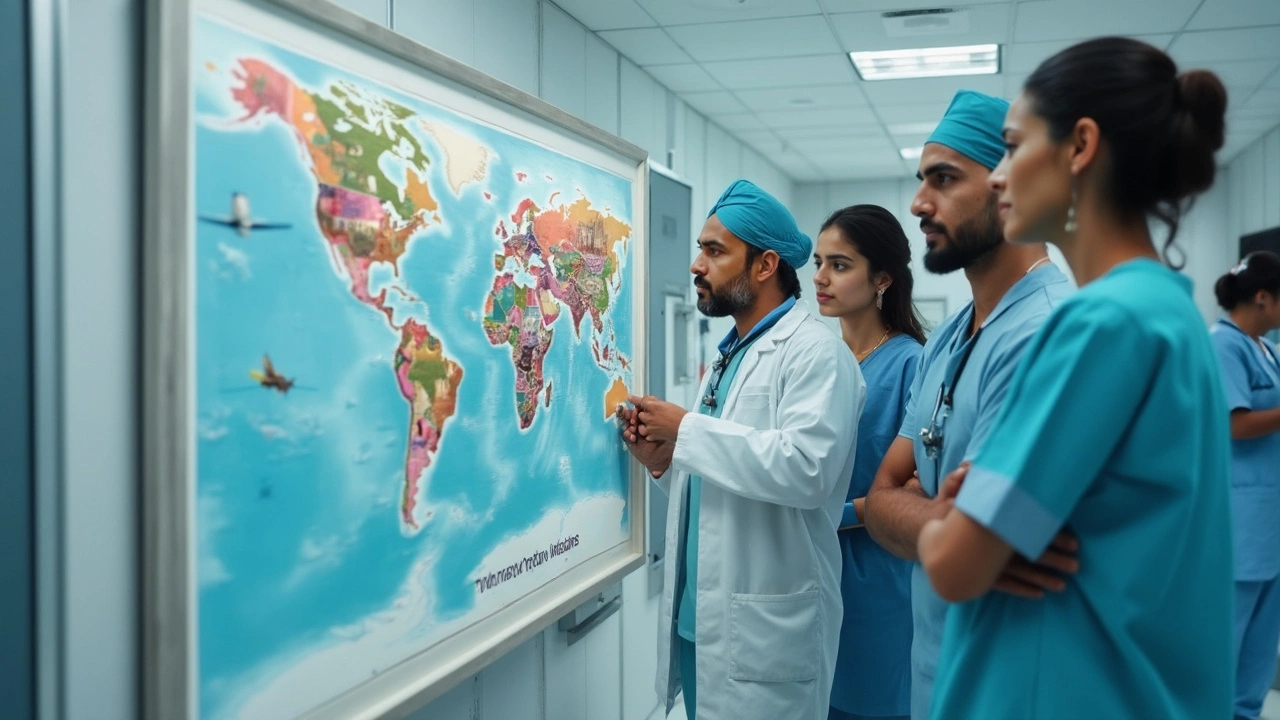Feeling overwhelmed by the thought of flying to another country for surgery? You’re not alone. With so many options out there, finding the best place for medical treatment can seem like a monumental task. But as medical tourism continues to gain popularity, knowing where to look might just save you a ton of stress—and cash.
First off, why are so many people hopping on planes for surgery? Well, it's often about chasing top-notch medical care at prices that won't break the bank. The idea is simple: some countries offer the same or better healthcare services but at a fraction of the cost. Whether it's dental work in Hungary, heart surgery in India, or cosmetic procedures in Thailand, there's a spot that's got what you're looking for.
The key here is research. You have to dig a bit into what each country's specialties are. Some places are famous for certain surgeries because they’ve invested heavily in those specific types of care. Plus, the local doctors there might be super experienced with the procedures that are sought after. This means you're basically tapping into a goldmine of expertise while saving a bit of your own gold, so to speak.
- Understanding the Rise of Medical Tourism
- Top Countries Known for Specific Surgeries
- Weighing the Costs: Surgery Abroad vs. Home
- Quality and Safety: What to Look For
- Language and Cultural Considerations
- Preparing for Your Medical Journey
Understanding the Rise of Medical Tourism
What's the big deal with medical tourism? Well, it's all about getting quality treatment without spending your life savings. People are catching on, and now millions are traveling every year to take advantage of this trend.
First, let's talk about costs. In some parts of the world, like the United States, healthcare can be insanely expensive. A knee replacement might set you back tens of thousands of dollars. But head over to someplace like India or Thailand, and you could get the same procedure for a fraction of the price. Add in the fact that many of these surgeries can be scheduled quickly, skipping those long waiting lists, and it starts to look pretty attractive, right?
Of course, cost isn't the only factor. We're also talking about quality. Believe it or not, several countries in Asia and Europe have medical facilities that rival—or even surpass—those in more developed nations. Places like Singapore, Costa Rica, and South Korea have cutting-edge technology and highly-trained staff, offering top-notch care across various procedures.
Now, let's not forget the cherry on top: a bit of travel adventure. While the primary goal is to get medical treatment, the idea of recuperating in a scenic location is a huge bonus. Imagine recovering from surgery while enjoying a serene beach or a lush mountain view, instead of being holed up in a gloomy hospital room.
But hey, it's not just individual patients fueling this boom. Many insurance companies and even some national healthcare systems are starting to cover treatments abroad, seeing the cost benefits. So you're not only saving money out of pocket but also seeing more substantial support for your choice of destination.
Overall, the rise of medical tourism is reshaping how we think about healthcare. It's about being smart with where you spend your money while still looking after your health. But as with anything, doing your homework is a must to ensure you make the most out of your healthcare journey abroad.
Top Countries Known for Specific Surgeries
Alright, if you’re looking for the best spots around the world for various surgeries, let’s break it down. Some countries have earned a solid reputation for certain kinds of medical procedures. Whether it's because of their state-of-the-art facilities, top-notch doctors, or super affordable prices, these countries have something going for them.
India is a big player in the medical tourism scene, especially when it comes to heart surgery and orthopedic procedures. Why? For starters, the cost is often one-third of what you’d shell out back home, and hospitals like Apollo and Fortis are renowned for their quality care. Dr. Devi Shetty, a notable cardiac surgeon, says,
"India offers advanced medical care at competitive prices, making it a preferred choice for many international patients."
If you’re thinking about dental work, like getting a smile makeover, then Hungary is the place to go. Dubbed the 'Dental Capital of Europe,' Hungary's clinics are equipped with the latest tech for treatments, often at prices that are far lower than in Western Europe.
For those considering cosmetic procedures, Thailand is always a top choice. It’s not just about the beautiful beaches and delicious food. Thai surgeons are well-known for being leaders in cosmetic surgeries such as breast augmentation and rhinoplasty. Hospitals like Bumrungrad International are often recommended due to their experienced staff and accreditation.
Now, Turkey particularly shines when it comes to hair transplant surgeries. They’ve got this down to an art, and Istanbul is packed with clinics that have mastered hair restoration techniques. Turkey has seen a huge influx of tourists specifically for this and is known for offering these services at about a quarter of the cost in Western countries.
Let’s look at a quick breakdown to compare the average costs for major surgeries:
| Country | Surgery Type | Average Cost (USD) |
|---|---|---|
| India | Heart Surgery | 10,000 - 15,000 |
| Hungary | Dental Implants | 1,500 - 2,000 per tooth |
| Thailand | Breast Augmentation | 3,000 - 5,000 |
| Turkey | Hair Transplant | 2,000 - 4,000 |
Of course, choosing the right place doesn’t mean picking the cheapest option. Quality and safety should be at the top of your list when considering any surgery abroad. But hey, it's pretty fascinating how different countries have become go-to spots for specific procedures, right?
Weighing the Costs: Surgery Abroad vs. Home
So, you're probably wondering if the idea of jetting off for surgery abroad is truly worth the hassle. Spoiler alert: It often is, but it really depends on a few key factors.
The first thing you gotta think about is cost. Countries like India, Thailand, and Mexico can offer medical procedures at a fraction of what you’d pay in places like the U.S. or the U.K. For example, a heart bypass surgery in the U.S. could set you back around $150,000, while the same procedure in India might cost just $7,000. That's a staggering difference!
Sure, the figures are enticing, but remember to factor in travel and accommodation expenses too. Fortunately, many facilities offer comprehensive packages that include flights, lodging, and even a personal post-op care plan, making it much easier to budget.
Here's a simple breakdown to chew on:
| Procedure | U.S. Cost | India Cost | Thailand Cost |
|---|---|---|---|
| Heart Bypass | $150,000 | $7,000 | $25,000 |
| Knee Replacement | $50,000 | $6,600 | $14,000 |
| Dental Implant | $4,000 | $800 | $2,000 |
The other big piece of the puzzle is quality. It's not just about hunting for the cheapest option—safety and results should be at the forefront. Fortunately, many countries have hospitals accredited by international bodies, which means they play by the same safety rules as Western hospitals.
Some folks worry about the 'hidden costs,' which aren't always about money. Think language barriers or the stress of being far from home during recovery. Preparing in advance and ensuring you have local support or a liaison can smooth out these bumps.
At the end of the day, the decision comes down to balancing the pros and cons. By carefully evaluating both financial and personal aspects, you can make a choice that best suits your needs and gives you peace of mind.

Quality and Safety: What to Look For
When you're thinking about surgery abroad, quality and safety are at the top of the list—no one wants to fly halfway across the globe and end up with regrets. So, let's dive into what you should really be watching out for to ensure you get the best care possible.
First things first, check out the hospital's accreditation. Many countries aiming to attract medical tourism clients are keen on this, so they strive to meet international standards. Look for certifications from bodies like the Joint Commission International (JCI) or the International Organization for Standardization (ISO). These show that the hospital maintains quality as per international guidelines.
Don't shy away from scanning through patient reviews online. Real-life experiences from other patients are like gold when it comes to picking the right place. Though it might seem obvious, knowing that other folks have been through a similar experience with positive outcomes can be incredibly reassuring.
Okay, what about the surgeons? That's where you zoom into their credentials and experience. See if they’re board-certified and have a bunch of completed surgeries under their belt. You want someone who doesn’t just know what they’re doing, but has done it a gazillion times before.
Medications and materials used are also crucial. Sometimes, supplies can differ in quality based on where you are. It's always a good idea to ask about the brands and origins of the materials being used in your surgery.
Security within the hospital shouldn't be overlooked either. Good hospitals ensure that your data and physical well-being are protected 24/7. From maintaining strict waste disposal protocols to having a robust emergency response team, these factors matter more than you’d think.
Now, here's a little extra: ask your local healthcare provider at home if they have any thoughts or connections abroad. They might just hook you up with someone who knows someone, which is always a plus in a networked world.
Language and Cultural Considerations
Okay, so you’ve picked a destination for your medical needs. But, have you thought about the language and cultural differences? These can really influence the success of your medical trip. When traveling for surgery, being able to communicate clearly with your medical team is crucial. This means knowing if language barriers will be an issue.
Luckily, many popular medical tourism countries cater to international patients and have English-speaking doctors and staff. For example, in countries like the Philippines, India, and Singapore, English is widely spoken in medical facilities. That being said, even if English is not the primary language, many hospitals hire translators to assist.
Now, let’s talk about culture. Cultural understanding isn’t just a nice-to-have—it can impact your whole experience. Familiarize yourself with local customs and etiquette. In some countries, direct eye contact might be seen differently, or gestures you use at home might have a different meaning abroad.
Here’s a quick list of cultural things you might want to consider:
- Research common local customs and traditions before you go.
- Understand the healthcare system in your destination. What's the process for appointments, follow-ups, or emergencies?
- Some places have different views about personal space and privacy, which could be relevant during hospital stays.
If you’re worried, try reaching out to others who’ve had similar experiences. There are plenty of forums or groups online where past medical tourists share their stories, offering insights on both medical and cultural sides of their trips.
Adapting to a new culture might seem daunting, but with a bit of prep, you'll navigate it like a pro. Remember, having clear communication and being culturally aware can make all the difference in your medical journey.
Preparing for Your Medical Journey
Packing your bags for a trip abroad is one thing, but getting ready for surgery in another country takes a whole new level of prep work. It's not just about booking a flight and hoping it all works out. Here's the lowdown on what you need to sort out before you head off for your surgery abroad.
First up, research like you mean it. Pick a specialist who has a good rep and hospitals with international accreditations. It's like checking reviews for a restaurant but with way higher stakes. Track down patient testimonials, hunt for success stories, and look into the surgeon's qualifications. Make sure they speak a language you understand, or at least have someone who does.
Now, onto the paperwork. It's frustrating, but a medical visa might be a must, depending on where you're going. Check visa requirements well ahead of time. Ensure you have all your medical records neatly organized. It's crucial to have this info ready so your overseas medical team knows what they're dealing with.
Insurance—ugh, right? But don't skip it. Get a travel insurance plan that covers medical tourism. Some regular plans don't cover surgeries abroad, so double-check and get what's right for you. It may feel like an extra expense but trust me, it can be a lifesaver.
- Confirm pre-op and post-op care needs.
- Plan recovery time and potential follow-up visits.
- Figure out transportation, including how you'll get around once you're there.
Here's a fun idea: make some room in your budget for a companion. Bringing along a friend or family member can provide a big boost to your moral support system. Plus, you'll have someone to look out for you and help navigate the local scene.
And while not mandatory, prepping for any cultural quirks could make the whole experience smoother. Simple gestures like knowing a few phrases in the local language or understanding etiquette go a long way.
Medical tourism is a big decision, but with the right prep, you can tackle it head-on. Keep calm, plan smartly, and you're more than halfway there!



